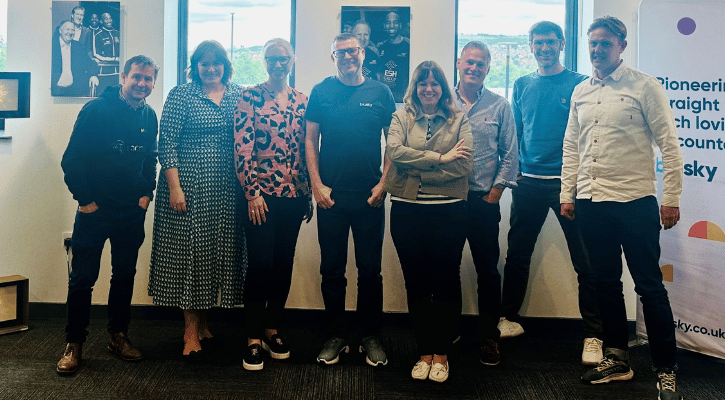We all know the phrase ‘cash is king’ but it takes more than that to grow a business. On top of knowing your numbers, forecasting and deciding whether or not to raise investment, there’s a lot more to juggle.

Co-founders of Blu Sky Chartered Accountants Jon Dudgeon and Dave Gibson recently held a round table with several leading north east business leaders to discuss the topic of navigating the scale-up journey.
Round table attendees included Land Digital founder, Jon Leighton, Sullivan Brown founder Maureen Brown, People Science founder Julia Smith, SQCDP founder, Stephen Mitchell, Chief Executive at NEL, Jonathan Luke, Just Williams founder Jessica Williams, and Strategic Projects Director at Umi, Julie Cuthbertson.
Read on for the key themes that came up, including some of the considerations and challenges these business leaders have come across when growing and scaling their businesses.
Cultural evolution and finding the right people
The group agreed that culture becomes more important as you grow. Stephen Mitchell explained: “We’re a very male-dominated business and the culture reflects this. We’ve talked about how we’ll make changes to diversify and welcome people from different backgrounds as we grow.”
Maureen Brown shared her experience: “I made a couple of hires and they didn’t land. It disrupted the culture, and that impacted performance, so we had to re-group. As you welcome more people to your team, your culture will evolve and sometimes you won’t get it right, but you can overcome this.”
Leading by example and not doing it on your own
As a leader, trying to do everything yourself can get overwhelming. The group agreed that you need to pick a few areas of focus and get comfortable with delegation.
Digital Agency owner, Jon Leighton explained: “Bring external people in to help establish your culture, brand and value proposition. Don’t try to do it all yourself.”
Jon continued: “Set the standard in terms of your own development and demonstrate that to your team. They will follow it.”
Jonathan Luke added: “Listen to other people and ask for their opinions, because nobody knows everything. Learn from other people's experiences, adapt, reform and refine.”
Preparing solid business plans
Dave Gibson covered the importance of solid business plans, especially when raising investment: “Your business plan is basically your CV. Like a CV, it can be disregarded straight away because of an error. Forecasts within your plan need to accurately reflect everything you’ll say when pitching to potential investors. If there are inconsistencies, you’ll fall at the first hurdle.”
Julie Cuthbertson reiterated that everything interlinks: “I've seen situations where the business plan was immaculately prepared. Financials were excellent, but the founder ineffectively delivered their culture and that was equally as jarring as a bad forecast.”
Introducing new ways of working
The panel agreed that ways of working have changed, and the rate of change accelerates as more people join your team.
Jessica Williams shared her observations: “Expectations have changed significantly from an employee’s perspective. Some want hybrid working, some don’t. Not everyone wants to be in the office all the time, so be mindful of where and how people want to work”.
Maureen added: “When you have new people coming in, you have to be more flexible because you need to support them to be successful. Change your approach to facilitate new people and ways of working.”
Julia Smith added: “There's been a real shift in terms of creating value for your people, not just extracting value from them.”
Solidify your processes including onboarding
On the point of introducing new ways of working, Jon Dudgeon emphasised that scaling businesses should have solid onboarding processes.
“The onboarding process is so important, especially with remote employees. Everything needs to be thought out. There needs to be many touch points and check-ins as people settle into their new roles.”
Jonathan Luke also discussed the importance of long-term development: “As your business grows, you need to consider if your people will still be able to fulfil their roles and what processes you’ll have in place to help them upskill.”















